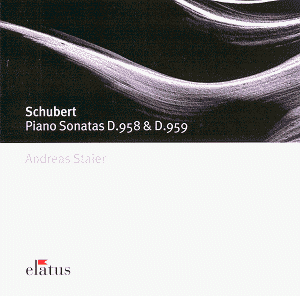Andreas
Staier plays these late Schubert sonatas on an 1825 Johann Fritz
fortepiano (the recordings have previously been available on Teldec
Das Alte Werk 0630 13143-2, a two-disc set which also included
the great D960). They now appear on a mid-price issue, representing
a considerable bargain. Purely from a historical performance viewpoint,
there is much of interest here: Staier plays on an 1825 Johann
Fritz four-pedalled fortepiano. In doing so, he immediately comes
into competition with Paul Badura-Skoda (on Arcana A17, whose
chosen instrument is an 1846 J. M. Schweighofer Viennese piano).
If we widen the field to include the modern concert grand, of
course Mitsuko Uchida on Philips appears as a leading contender
(alas not at this price, though). Imogen Cooper is no stranger
to these pieces, either, and her recent concert performances have
attested to her affinity to Schubert’s keyboard world.
Right
from the opening of the C minor (D958), Staier finds natural flow
and demonstrates an enviable sensitivity to Schubert’s harmonic
progressions while remaining true to the Beethovenian elements
contained within the notes. Accents and dynamics are exciting,
the dramatic schema vividly projected (Badura-Skoda is more thoughtful,
his rhythms not quite as alive). Staier’s Adagio is, again, presented
in the most natural of fashions, and is all the more touching
for it. Only the hesitations before the block chords (c2’45 in)
do not come across as entirely convincing.
The
lively speed for the finale does not, commendably, lead to any
muddying of textures (the very nature of the instrument helps
here). His handling of the passage around 3’15, a cantabile
right hand against a rustling left is pure delight – after hearing
Staier, Badura-Skoda in this movement seems rather disjunct and
rough and ready.
Imogen
Cooper gave the last live performance of D959 I heard (at the
Wigmore Hall in July). Staier sets out to give a robust account
– he is almost brutal before a defining feature of this sonata’s
opening, the ‘church cadence’. Despite his determination, though,
some contrapuntal passages do emerge as laboured. His Andantino
lacks Cooper’s Winterreise-like sense of stasis, although
he does to an extent redeem himself with the famous manic outburst
(immediately before the recitative-like passage, the fortepiano
sounds as if it will burst!). Similarly, it is entirely characteristic
of Staier’s account that the Scherzo, while appearing capricious
and cheeky, can also at times verge on the violent.
Alas,
it is only in the finale that Staier can in any real way be said
to disappoint. This movement (marked Allegretto) requires the
calm unfolding of Cooper or Uchida. Staier is lumpy in his presentation
of the initial theme and he thumps later on (around 5’20). This
emerges as a good but not elevating presentation of a finale that
can be so much more and as if to confirm this, the coda verges
on the breathless.
Very
much a disc worth hearing, then, and one that will surely complement
some treasured modern instrument performances of these works.
Colin
Clarke
